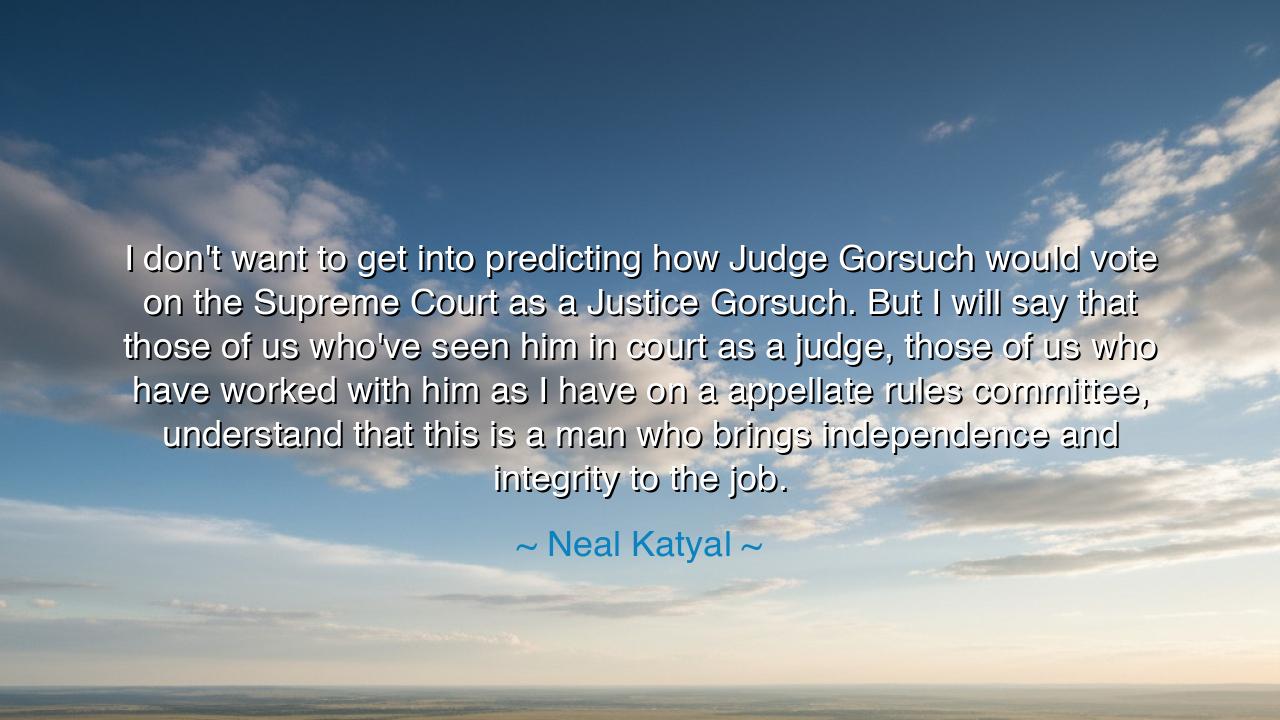
I don't want to get into predicting how Judge Gorsuch would vote
I don't want to get into predicting how Judge Gorsuch would vote on the Supreme Court as a Justice Gorsuch. But I will say that those of us who've seen him in court as a judge, those of us who have worked with him as I have on a appellate rules committee, understand that this is a man who brings independence and integrity to the job.






The words of Neal Katyal rise with quiet reverence, carrying both respect and warning. When he said, “I don't want to get into predicting how Judge Gorsuch would vote on the Supreme Court as a Justice Gorsuch. But I will say that those of us who've seen him in court as a judge, those of us who have worked with him as I have on an appellate rules committee, understand that this is a man who brings independence and integrity to the job,” he was not merely offering praise. He was speaking of two virtues—independence and integrity—that are as vital to justice as air is to breath. His words are not about a single man, but about the spirit of the law itself, and the rare character required to serve it faithfully.
To understand the weight of Katyal’s statement, one must first know the setting from which it arose. The year was 2017. Judge Neil Gorsuch, then serving on the Tenth Circuit Court of Appeals, had been nominated to the Supreme Court of the United States by President Donald Trump. The nation, divided in heart and mind, looked upon the appointment with both hope and suspicion. In such a time, every voice carried consequence. Yet Neal Katyal, a Democrat and former Acting Solicitor General under President Obama, stood before the public and defended the nominee’s character—not his politics, not his predictions, but his principle. This act itself was rare and courageous, for in an age of partisanship, to praise an adversary for his virtue is to remind the world that truth still matters more than tribe.
Katyal’s words strike at an eternal truth: that justice is not measured by allegiance to power, but by fidelity to conscience. A judge, in the purest sense, is not a servant of kings, nor of crowds, but of truth itself. To sit upon the bench is to bear the weight of moral solitude—to stand alone when the winds of politics blow strong. The independence of the judiciary is not a mere institution; it is a living promise that no man’s rights shall be lost to the passions of the moment. Katyal saw in Gorsuch not perfection, but a temperament worthy of the robe—a man who could listen to argument without bending to influence, who could hold fast to his reason even when the world clamored for easy answers.
There is a story, older than any court, that illustrates this spirit. In the city of Athens, during the age of Pericles, there lived a man named Aristides, known as “the Just.” He was so respected for his fairness that citizens came to him with their disputes, trusting his word more than the law itself. Yet when his enemies grew jealous and sought his exile, they held a vote to cast him out. A stranger, not knowing he spoke to Aristides himself, handed him a shard of pottery and said, “Write down the name of Aristides, for I am tired of hearing him called ‘the Just.’” Aristides, without anger, wrote his own name upon the shard. He accepted exile rather than compromise the principle that justice must remain pure, even at his own expense. Such is the measure of integrity—to do what is right, even when it costs all comfort.
Neal Katyal’s words belong to that same tradition. He reminds us that integrity is not agreement—it is consistency of soul. A man of integrity can be opposed, yet respected; disagreed with, yet trusted. In a world that too often demands allegiance over honesty, such a man becomes a rare pillar of stability. To call someone “independent” is not to say they are stubborn, but that they belong to no faction except the truth. It is this kind of integrity that allows nations to endure through division, for when justice loses its independence, the people soon lose their freedom.
In the voice of the ancients, we may say: the judge must be a mountain amid storms—steady when tempests rage, unmoved by flattery or fear. For when the law is twisted by those who wield it for power, the nation decays from within. The honor Katyal ascribes to Gorsuch, then, is not a crown, but a burden—the eternal duty of those who must judge without bias, who must see with clear eyes even when the world demands blindness. True independence is not separation from others—it is loyalty to a higher order, to reason, conscience, and the timeless pursuit of justice.
Thus, let this lesson be preserved for the generations: honor those who act with integrity even when they stand apart. Do not measure worth by whether one agrees with you, but by whether they are guided by truth and courage. For the strength of any republic lies not in the noise of its partisans, but in the quiet resolve of those who uphold justice without fear or favor.
The practical path is this: in your own life, cultivate independence of thought and integrity of action. Do not twist truth to fit convenience, nor change conviction to win applause. Whether in the halls of law, in the workplace, or in the home, let your word be as steady as the mountain, and your conscience as bright as the sun. For as Neal Katyal reminds us, the measure of greatness is not in how one votes or speaks, but in whether one stands unshaken when the world demands compromise.






AAdministratorAdministrator
Welcome, honored guests. Please leave a comment, we will respond soon